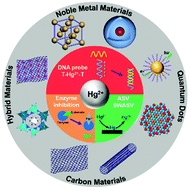Electrochemical mercury biosensors based on advanced nanomaterials
Abstract
Mercury ion (Hg2+) is a typical heavy metal ion that shows strong toxicity and readily accumulates in the human body; it is a source of severe pollution in ecological systems. The detection of trace Hg2+ is an active research area for developing accurate and sensitive electrochemical biosensors. Recently, numerous novel nanomaterials have been successfully designed with remarkable advantages in Hg2+ recognition due to their strong electrocatalysis, specific surface areas, conductivities, etc. This review aims to present the latest progress in advanced nanomaterials for electrochemical Hg2+ detection. Emphasis will be given to the main detection mechanisms and nanostructure control methodology of these nanomaterials. Meanwhile, the performance of various nanomaterials-based mercury biosensors will be compared to discuss their positive effects on the detection performance of different nanostructures. This article is expected to provide inspiration for the design of novel nanomaterials to construct high-performance electrochemical mercury biosensors.

- This article is part of the themed collection: Recent Review Articles


 Please wait while we load your content...
Please wait while we load your content...